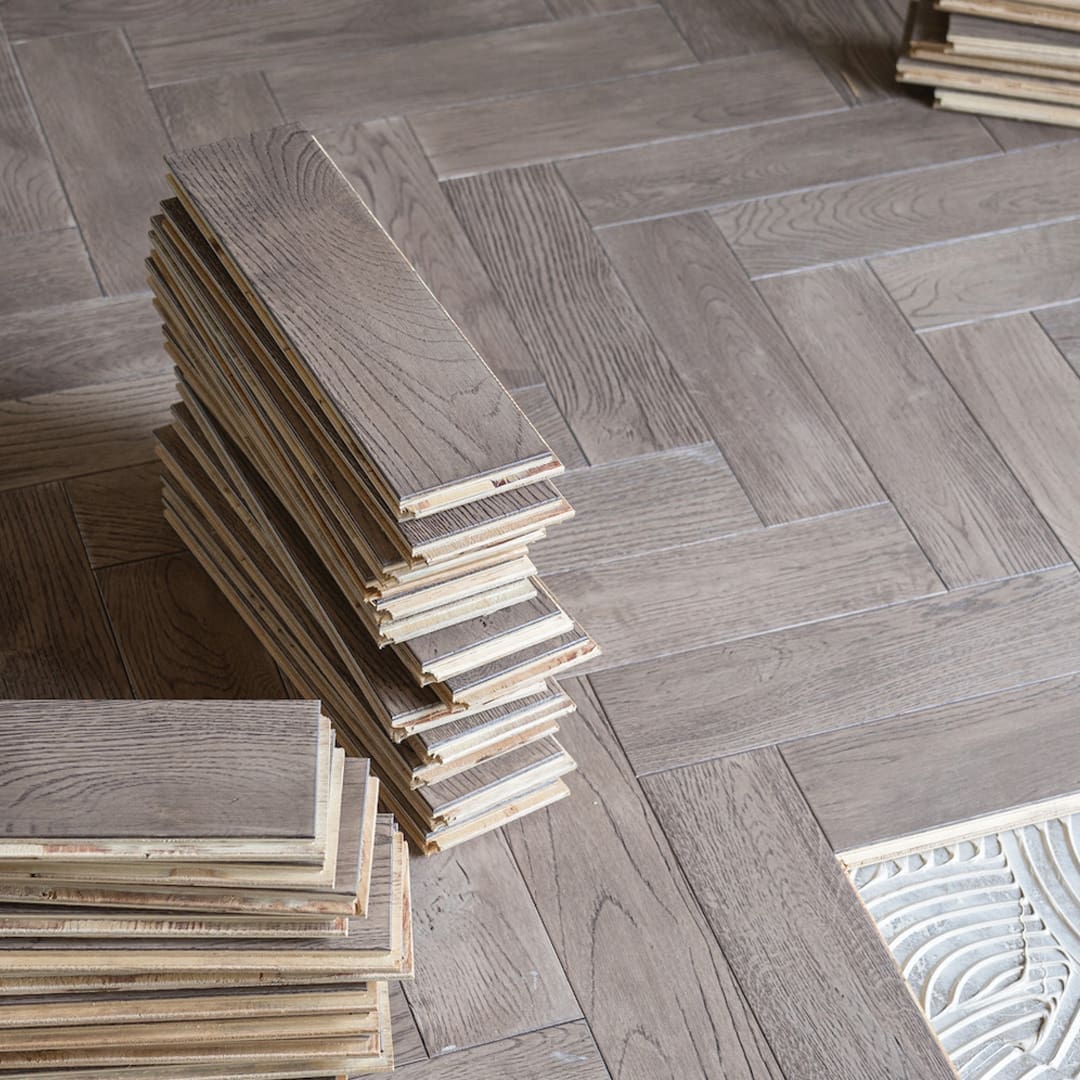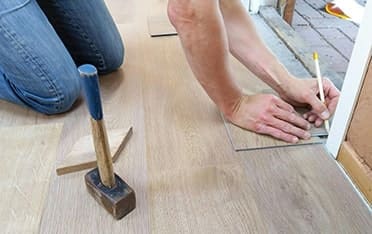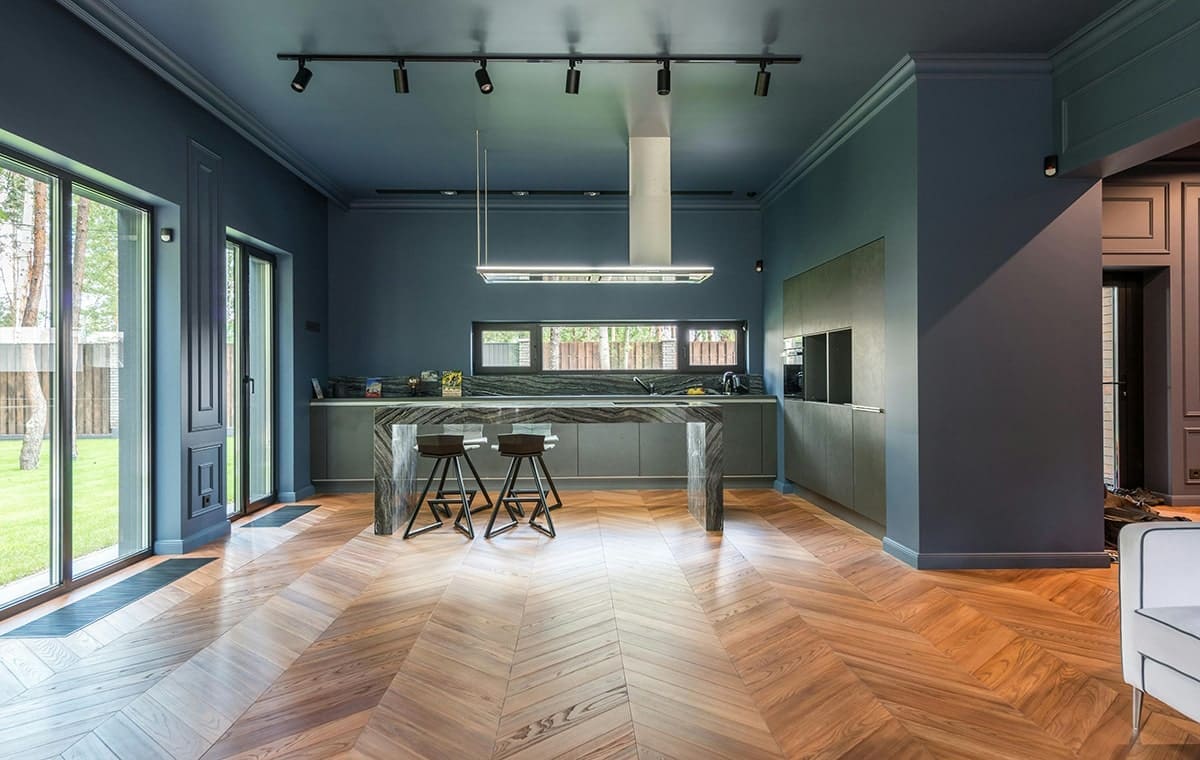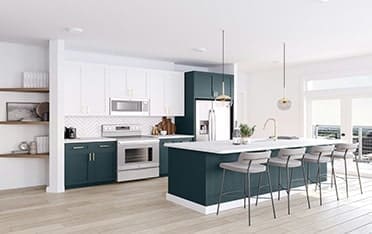Choosing the right flooring is an essential decision for any homeowner. Engineered Wood vs Solid Wood is a common debate, as both options offer durability, beauty, and value. However, they differ in structure, performance, and suitability for different environments. Understanding the difference between Solid Wood and Engineered Wood will help you make an informed choice.
What is Engineered Wood?
Engineered Wood Flooring offers the perfect blend of durability, elegance, versatility, & sustainability making it the ideal luxury option for homeowners who demand nothing but the best for their home. It is composed of cross-layered plywood and has a top layer of real wood.
What is Solid Wood?
Solid Wood Flooring offers the perfect blend of traditional beauty, durability, comfort, and warmth making it the ultimate choice for luxury homes. It is very simply made from a single piece of hardwood such as Oak or Walnut.
Durability Comparison: Engineered Wood vs Solid Wood
When choosing between Engineered Wood and Solid Wood, durability is a key factor to consider. Each has distinct strengths and weaknesses depending on the intended use, environmental conditions, and maintenance.
- 1. Structure & Composition
- Solid Wood is made from a single piece of natural hardwood, providing a dense and strong material. Engineered Wood is composed of a plywood or high-density fibreboard (HDF) core with a thin veneer of natural wood on top. The layered construction enhances stability.
- 2. Resistance to Moisture & Temperature Changes
- Solid Wood is prone to expansion, contraction, and warping when exposed to humidity and temperature fluctuations. Engineered Wood is more stable due to its multi-layered construction, making it less likely to warp or crack in high-humidity environments.
- 3. Longevity & Wear Resistance
- Solid Wood can last for decades (even centuries) with proper care. It can be sanded and refinished multiple times to restore its surface. Engineered Wood has a lifespan of 20-40 years, depending on the thickness of the top veneer. Can be refinished a few times, but not as extensively as solid wood.
- 4. Strength & Load-Bearing Capacity
- Solid Wood is generally stronger and more capable of supporting heavy loads. While Engineered Wood is durable, it may not support as much weight as solid wood, especially in furniture applications.
- 5. Scratch & Dent Resistance
- Solid Wood can be prone to scratches and dents, but they can often be repaired by refinishing. Similarly, Engineered Wood has a top veneer that is real wood and can scratch, but deeper dents may be harder to fix since the core material is not solid hardwood.
Appearance of Engineered Wood Vs Solid Wood: Which One Looks Better?

Both Solid Wood and Engineered Wood are incredible choices aesthetically for your room. In many ways, they can be very similar both coming in a wide variety of grades and colours. However, there are some differences, such as plank length and finishes, which can be a deciding factor when choosing between the two floors.
Solid Wood flooring offers authentic, timeless beauty. Its appearance and character are often highly valued and cannot be completely replicated by Engineered Wood. There is inconsistency in sizing for the planks as they tend to be quite sparse and generally shorter than Engineered Wood planks. There are also far fewer choices for colours and finishes which can be a dealbreaker for some.
Engineered Flooring on the other hand, while not being able to offer the exact, authentic look and feel of Solid Wood, does a very good job of getting as close to it as possible. In addition to this, the planks are of equal length giving them a more streamlined, clean look. Finally, there are a wide variety of finishes and colours to choose from giving you more freedom and choice as to how you want your planks to look and feel.
In conclusion, it will mainly come down to personal preference and how much control you wish to have over the look and feel of your floor. Solid Wood is generally better if you want a more authentic experience with your floor and don’t mind the lack of design choices. However, if you want more control on how your floor looks and feels with a similar look to Solid Wood, then Engineered Wood might be the better option for you.
- Solid Wood offers a more authentic look and feel but has inconsistent plank sizes and a lack of finishes to choose from.
- Engineered Wood offers a similar look to real wood with equal plank lengths and a variety of finishes and colours available.
Installation Process: Ease of Installing Engineered Wood vs Solid Wood

Solid Wood and Engineered Wood use very similar installation methods as they can either be glued down or nailed down. However, Engineered Wood can be slightly better installed with its integrated click-lock system.
- Solid Wood can be installed using a glue-down method. This requires a flooring adhesive to be applied before installing the flooring itself. It is not recommended for beginners.
- Solid Wood also uses a nail-down method. This method fixes down the flooring using nails. It is also quite difficult as it requires a lot of precision and specialised tools.
- Engineered Wood can also be installed using the above methods of glue down or nail down
- Engineered Wood also includes the click-lock system. This is where the planks are fitted by interlocking them in with each other. This method is one of the easiest ways to install flooring.
In conclusion, Engineered Flooring is slightly easier to install as it allows for the floating method to be utilised making it a good option for beginners. However, if you are a more experienced DIY-er or are going to use a professional fitter, then it won’t make much of a difference whether you choose Engineered Wood or Solid Wood.
- Solid Wood can be installed by Glue-Down or Nail Down and is not recommended for beginners
- Engineered Wood can be installed by Glue Down, Nail Down or the Click-Lock system and so it can be installed by beginners.
Maintenance: Caring for Engineered Wood and Solid Wood Floors

Both Engineered Wood and Solid Wood flooring are low maintenance when it comes to cleaning, only requiring a regular sweep or vacuum. However, with that being said, it might be slightly easier to maintain Engineered Flooring. Solid Wood can actually require more care and attention. This is because it is more sensitive to temperature change, moisture damage and fluctuations making it very likely to warp. However, it should be noted that Solid Wood will significantly outlast Engineered Wood. Engineered Wood can last about 50 years compared to Solid Wood which can last double the amount of time with proper care and maintenance.
In conclusion, while both are low-maintenance flooring options, Engineered Wood requires less attention and maintenance than Solid Wood as it is able to protect against temperature change and moisture damage (to an extent). However, in the long run, Solid Wood will significantly outlast Engineered Wood being able to last double the lifespan of Engineered Wood.
- Solid Wood requires more attention and care due to temperature change and moisture damage but can last over 100 years
- Engineered Wood is extremely low maintenance but can only last up to 50 years if looked after well.
Cost Comparison: Engineered Wood vs Solid Wood Pricing
Cost for Engineered Wood and Solid Wood flooring range between different prices. Solid Wood tends to be in the more expensive range starting from £40 per m2. Meanwhile, our Engineered Wood flooring is a bit more affordable with prices starting from £30 per m2. For DIY-enthusiasts who are looking for cost-effective installation, Engineered Wood is the best choice. It offers a variety of installation methods and can also feature a click-lock system.
Overall, Engineered Wood is a more affordable option for your home. Not only is it lower in price than Solid Wood but it also gives you more value for money compared to other Solid Wood options available for the same price.
- Solid Wood tends to be more expensive starting from £40 per m2.
- Engineered Wood is more affordable starting from £30 per m2.
Environmental Impact: Sustainability of Engineered Wood vs Solid Wood
It is important to factor in the impact that our flooring can have on the environment during both the production process and when in our homes. The less environmental damage caused, the better. While both flooring types are quite environmentally friendly, Engineered Wood may actually be more sustainable in the long run.
Solid Wood requires far less manufacturing labor to create the planks. However, a significant amount of wood is required to create the planks causing a wastage in the amount of materials used. To help prevent this, more common wood types like Oak, should be bought instead of rarer wood types that may be on the verge of extinction like Pink Ivy or African Mahogany.
Many Engineered Wood products are very environmentally friendly, as they use less of the top-quality hardwood species and may incorporate sustainable sourcing practices. In essence, this means that if the same amount of a tree were used for both Solid Wood and Engineered Wood, it would help to produce a lot more planks for Engineered Wood than it would for Solid Wood.
In conclusion, while both are fairly environmentally friendly, Engineered Wood appears to be the option which is more “green”. This is because it doesn’t use as many materials to create the planks, helping to prevent some tree types from eventually becoming extinct. However, it should still be taken into consideration that Solid Wood does require less manufacturing to create the planks than Engineered Wood.
- Solid Wood doesn’t require as much manufacturing labour but uses a lot more hardwood resources to create the planks.
- Engineered Wood is far more environmentally friendly as it doesn’t use nearly as many hardwood resources.
Best & Worst Use Cases: Where to/Where not to Install Engineered Wood and Solid Wood
While both can be a great choice for most rooms and settings, Engineered Wood and Solid Wood have rooms where they each work better in. Additionally, they also have rooms where you should avoid putting them in to prevent damage to the floor and room.
Solid Wood will look phenomenal in most rooms especially given its timeless appearance. It especially shines in Living Rooms, Dining Rooms and Bedrooms. However, Solid Wood should not be installed in kitchens, bathrooms or anywhere that is prone to moisture due to the lack of water-resistance.
Engineered Wood also looks incredible in most rooms and shines in Living Rooms, Dining Rooms, and Bedrooms. Engineered Wood does have some water-resistant properties which means that it can be installed in the kitchen. It can also be installed in the bathroom but you should take extra precautions if you decide to do this as Engineered Wood is not 100% waterproof.
- Solid Wood: Best for living rooms, dining rooms, and bedrooms. Avoid kitchens and bathrooms due to moisture sensitivity.
- Engineered Wood: Suitable for all areas, including kitchens. Can be installed in bathrooms with extra precautions as it is not 100% waterproof
Conclusion
In conclusion, both Engineered Wood and Solid Wood are great choices for your floor. Engineered Wood is typically more practical for areas with moisture concerns and offers cost savings and greater control over your preferred aesthetic. Solid Wood, on the other hand, provides unmatched natural beauty, longevity, and the ability to refinish multiple times.
It’s essential to assess your specific needs and preferences, as well as your budget, before making the decision. Additionally, consulting with a flooring professional can help you choose the right type of wood flooring for your project.
Contact Us
For any flooring queries, drop us an email at info@flooringsurgeons.co.uk – or Visit our showrooms located in Birmingham & Wolverhampton!
Shop our premium Engineered Wood and Solid Wood flooring collections online and in-store today!
Halesowen
214A Dudley Road. Halesowen, Birmingham, B63 3NJ
0121 274 8575
Monday – Friday: 9AM – 6PM | Weekends: 10AM – 4PM
Wolverhampton
317 Penn Rd, Wolverhampton, West Midlands, WV4 5QF
01902 836666
Monday – Friday: 9AM – 6PM | Sat: 10AM – 4PM | Sun: Closed
info@flooringsurgeons.co.uk
fitting@flooringsurgeons.co.uk
customerservices@flooringsurgeons.co.uk










